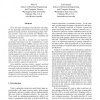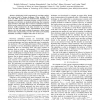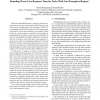365 search results - page 7 / 73 » Semi-automatic derivation of timing models for WCET analysis |
108
click to vote
RTCSA
2007
IEEE
15 years 6 months ago
2007
IEEE
Given the major advantages of productivity and safety, the use of garbage collection (GC) in real-time systems has gained increasing attention. Guaranteeing garbage collection act...
DATE
2010
IEEE
15 years 4 months ago
2010
IEEE
Abstract—Employing COTS components in real-time embedded systems leads to timing challenges. When multiple CPU cores and DMA peripherals run simultaneously, contention for access...
121
click to vote
DAC
2003
ACM
16 years 20 days ago
2003
ACM
Schedulability analysis of real-time embedded systems requires worst case timing guarantees of embedded software performance. This involves not only language level program analysi...
110
click to vote
SEUS
2005
IEEE
15 years 5 months ago
2005
IEEE
In the last years the number of electronic control systems has increased significantly. In order to stay competitive more and more functionality is integrated into more and more p...
108
click to vote
RTAS
2008
IEEE
15 years 6 months ago
2008
IEEE
Real-time schedulability theory requires a priori knowledge of the worst-case execution time (WCET) of every task in the system. Fundamental to the calculation of WCET is a schedu...



